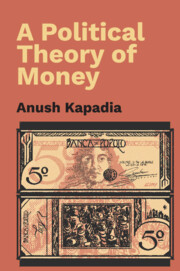1 - Money Anchored to the Future
Published online by Cambridge University Press: 14 September 2023
Summary
Money is institutionalised social power, the power of people working together, implicitly or explicitly, in a division of labour to produce a collective output. Money is the result of an institutional process which encapsulates the power of productive collective action in a flexible, tradable instrument. Yet it takes an entire system of hierarchically concatenated institutions to transform a collective's powers of production into a highly liquid instrument. This book outlines the nature of that system. It discusses this process in theory (Part I) before moving on to a series of cases to illustrate how variations in the politics of collective action lead to variable monetary quality (Part II).
Why does something so seemingly insubstantial—a promise, a paper note, a digital ledger entry—have real value? This is perhaps the central mystery of money. Anecdotally, we know that many people still think money is backed by gold (or ought to be), something confirmed by emerging scholarship (for example, Kraemer et al., 2020). In order to fully account for money, we cannot dismiss such perceptions as mere error or false consciousness. Social theory has to explain how a credit instrument, a promise, can durably and systematically function like a real commodity. What is it about the money system that enables promises to function like valuable things? Why are some monies better than others? Why are money systems always hierarchical?
We propose a political theory of money as an answer. Social theorists have of course long argued that money is a social relation, but that still begs the question of why some social relations generate better, more widely acceptable money than others. To answer this question, we need a theory of types of social relations that map onto variable monetary robustness. We also need a theory of the social function of money because what counts as a ‘better money’ itself presupposes a particular historical social formation. The functional requirements of money change with the dominant social formation. As such, the prevailing form of money in any epoch tells us a great deal about how we have chosen to live and work together. The kind of money we have emerges from the kind of society we have.
As money has grown even more abstract, rich nations have become hyper-financialised, and inequality has grown to the point of breaking down the very legitimacy of states.
- Type
- Chapter
- Information
- A Political Theory of Money , pp. 3 - 24Publisher: Cambridge University PressPrint publication year: 2024



